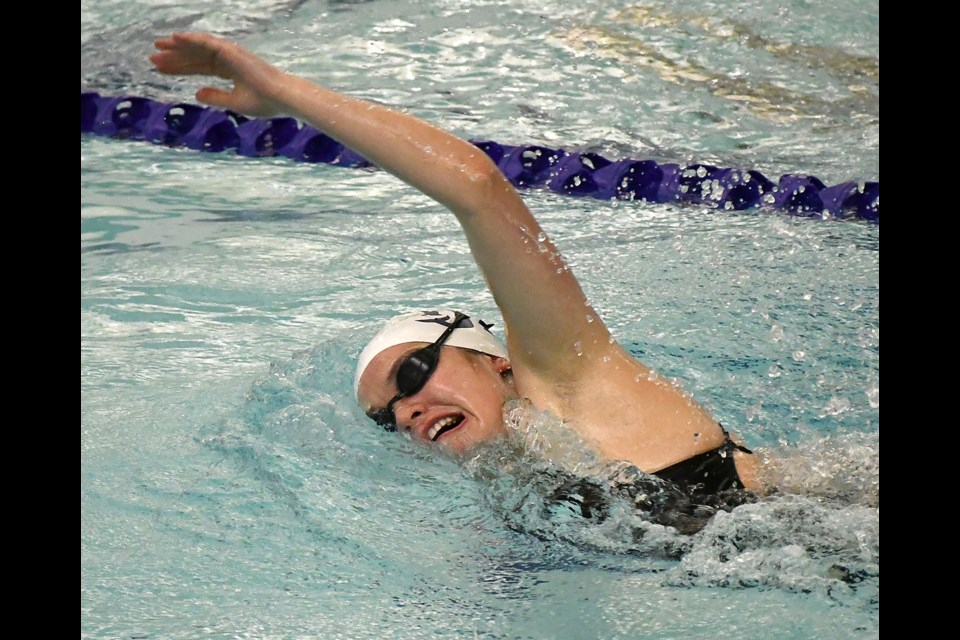Moose Jaw’s swim club is concerned that the new outdoor pool will put its members at a competitive disadvantage because of the proposed size and believes a bigger venue is necessary for success.
Executive members and supporters of the Moose Jaw Kinsmen Flying Fins attended city council’s May 9 regular meeting and attempted to persuade council to build a new outdoor pool with 50-metre swim lanes instead of the proposed 25 metres. However, after discussion, council later approved a motion to pursue federal funding for a pool with 25-metre-long lanes.
The Moose Jaw Express will have a separate story about that discussion.
Presentation
The Flying Fins are the community’s only competitive swim team, the only major user group of the Sportsplex and Phyllis Dewar pools, have existed for 50 years, have thousands of alumni, and are competitive provincially and nationally, explained president Rick Johns.
As a year-round swim team, the group’s year is divided into two training and competition seasons, he said. The short course starts in the fall and occurs at the Kinsmen Sportsplex, with 25-metre-long lanes. The long course occurs in the second half at the Phyllis Dewar, which has 50-metre-long lanes and is an Olympic-sized venue.
“With the long-course meet and long-course pool, that’s where all the major swimming events occur, such as ManSask Provincials, Western Canadian championships, junior championships, Olympic trials and world championships,” Johns said.
Moose Jaw’s outdoor pool is named after Olympian Phyllis Dewar, while the Flying Fins’ Mike Mintenko Summerfest honours that Olympic athlete.
“We are very small, but we’re mighty. We’re very competitive within the swimming community,” Johns remarked. “We have the highest ratio of Olympic trial (athlete) qualifiers compared to two other clubs.”
Pre-pandemic, the club had three out of 117 members qualify for the Olympics. In comparison, a Regina club had five out of 313 members qualify and a Saskatoon club had three of 433 members qualify. Furthermore, the Flying Fins have the distinction of breaking 14 records between 2015 and 2020.
The club currently has 85 members as it rebuilds post-pandemic.
“Reducing the outdoor pool size to 25 metres will eliminate the possibility of the athletes to train in a long-course pool during the long-course season, potentially putting them at a competitive disadvantage,” said Johns.
At least 15,000 athletes from across North America have participated at Summerfest during the past 50 years, while the meet is one of the most popular events in Canada since Saskatchewan is one of only two provinces that offers outdoor long-course competitions, he continued.
Also, Moose Jaw is one of only three Canadian cities — Montreal and Vancouver, the others — with an Olympic-sized outdoor pool. However, in Saskatchewan, Swift Current, Prince Albert, Regina and Saskatoon are the only communities with indoor Olympic-sized pools.
The club’s concern is that that half-century legacy would cease without a 50-metre pool, and not only would athletes lose out on a competitive opportunity, but there would also be negative financial effects on the city, Johns stated. Research shows that Summerfest generates roughly $100,000 annually for the community.
“By factoring in a conservative two-per-cent inflation rate per year, it (an Olympic-sized pool) would generate $8.5 million from our swim meet alone by 2072,” he added.
The club normally holds one outdoor competition a year and one indoor competition a year, attracting about 300 swimmers, including about 250 from outside the community, Johns told Coun. Doug Blanc.
Meanwhile, the club has a rental agreement with city hall to use the outdoor pool from early June to late July, depending upon the events athletes qualify for. If they reach the Canada Games, they train through August.
Elite club competitors train 14 hours a week, including 10 to 12 hours in the pool and two hours on dry land, Johns told Coun. Jamey Logan. Meanwhile, unless there is a thunderstorm, the club will train in any weather.
The next regular council meeting is Tuesday, May 24.




